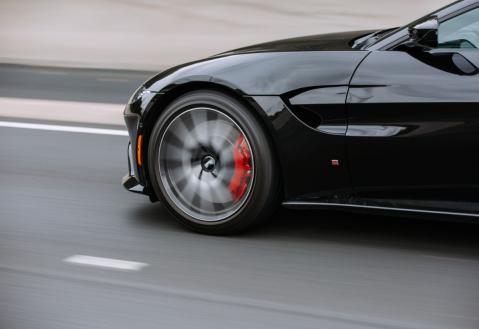Imagine going on vacation and having a long road trip, the weather is nice and you feel happy to have some time off; suddenly, you hear a strange noise going out of your car. A joy breaker right?
Some noises are common to hear while driving and may not be a cause of a big problem, while others may be a sign of some serious issues and should not be left without professional advice.
Here are nine common noises that might be warning signs which would spell trouble:
- Squealing brakes
- Grinding brakes
- Groaning yawn while making a turn
- Squeaking while turning the wheel
- Squealing under the hood
- Knocking in the engine compartment
- Popping noise in the engine
- Flapping noise when running the AC
- A Rumble from the exhaust
1. Squealing Brakes

-
What you hear?
A light screeching sound coming from your tires when you press on the brake pedal.
Its sound is similar to nails on a chalkboard every time you press on the brake pedals.
-
What is happening?
Inside the brake hydraulic system, the brake pad indicator “a piece of metal” is screeching up against the brake rotor once the pad material gets low, which results in the squealing sound.
-
Should you worry?
Don’t worry, it is not a big concern! The brake pad indicator is there to tell you when your brake pads have worn out and need a change.
A simple process of cleaning, adding the right lubricant, or adjusting the materials could help.
Remember to have it checked and fixed by the mechanic before the screech sound transforms into a shout.
2. Grinding Brakes
-
What you hear?
Loud, metal on metal scraping sound coming when applying your brakes.
-
What is happening?
Your brake pads have been worn out completely as the calipers are grinding against the brake rotor, bare metal rubbing against bare metal.
-
Should you worry?
You should get your brakes checked out immediately!
Metal on metal grinding is not an ideal situation for a healthy car brake system. Driving without healthy brake pads is extremely hazardous! A failing brake system or a delay could cause a serious accident.
When you hit the road, don’t let it hit you back! Be ahead of breakdowns and get it checked by the professional mechanic.
3. Groaning Yawn While Making A Turn
-
What you hear?
When you turn the steering wheel, the vehicle groans and whines like it just woke up from a deep wonderful sleep.
In other words, it has a high-pitched whine when you “lock” the steering wheel by turning it to the point at which it doesn’t turn anymore.
-
What is happening?
Something in your power steering system is causing stiffness and friction. You may feel that the steering wheel is firm, stubborn, and unresponsive. Those are usually an indication that the power steering pump lifespan is coming to an end.
-
Should you worry?
This can be a serious issue if you don’t have your power steering looked at in the early stages! You might eventually lose control of it!
As the problem persists and worsens, you will gradually lose control over the vehicle's steering. And further down the road, you would harm your car’s power steering system.
A word of advice to share here, avoid sudden or fast turns, and have it checked immediately by the professional.
4. Squeaking While Turning The Wheel

-
What you hear?
A squealing noise as you are turning the wheels. Usually you will notice the squeaking noise coming from the front of the car, centered near your steering column all the way out to your wheels.
-
What is happening?
Similar to the groaning yawning noise, this is a sign of a problem with the power steering system. However, this squealing could be an indication of low power steering fluid.
-
Should you worry?
There is no need to worry that much. Simply open the hood, check the level of your power steering fluid, and top it up. Usually doing so solves this issue.
Keep an eye on it. If this problem persists and you keep hearing the strange noise, you might need to visit the nearest mechanic. You may have a hole in the power steering lines.
5. Squealing Under The Hood
-
What you hear?
A high-pitched noisy screeching sound, like a bird chirping, coming when you first start the engine.
-
What is happening?
This is an indication of a loose, cracked, or worn-out serpentine belt.
-
Should you worry?
The serpentine belt controls your vehicle's major frameworks and systems. And with a screeching sound, the belt could break at any moment.
The serpentine belt should be replaced immediately as it is an extremely important part of driving the torque from the engine to make other crucial parts work. Without it, you will be left with a car that won’t go anywhere.
Be cautious before things go in the other way! So when you hear this squealing sound, head to your nearest workshop.
6. Knocking In The Engine Compartment
-
What you hear?
A constant knocking or pinging coming out of the engine.
-
What is happening?
Engine knocking is a typical thing that happens when not using the vehicle manufacturer gasoline grade recommendations.
Using a lower octane grade gasoline when it requires a higher one could lead to spark plugs damages, which would result in the engine pistons to move erratically, which would generate the engine knocking sound.
In other words, putting in a low-quality fuel will generate a low-quality air-fuel mixture which eventually leads to that strange sound.
-
Should you worry?
This can easily be rectified by ensuring the usage of the right octane grade type of fuel.
However, if you are using the right fuel grade and the sound keeps on happening, have it checked immediately. A minor unchecked problem in the engine could lead to major engine damage.
7. Popping Noise In The Engine

-
What you hear?
A popping sound that comes from your car’s engine, usually tells you that your car needs to be serviced.
-
What is happening?
Worn-out spark plugs and/or clogged fuel filter.
-
Should you worry?
Popping is one of the most widely recognized vehicle sounds experienced by drivers.
This can happen because of many reasons. A clogged fuel filter can cause such sounds. Bad spark plugs can cause it as well. Also, your engine can make such sounds if it is low on engine oil!
Avoid this popping sound by getting your car checked during its regular services.
8. Flapping Noise When Running The Air Conditioning
-
What you hear?
A fluttering or slapping sound, like a flapping fish out of the water, when running the air conditioning or blowers system.
-
What is happening?
Typically it happens because of a loose, worn out, disintegrated, or broken ventilation flap belt.
-
Should you worry?
No big deal!
A broken ventilation flap belt is not a serious safety issue as it only affects the airflow stream.
Turn up the tunes, lower your window, and enjoy the fresh air. Or simply, get over the annoying flapping noise by getting it fixed by the professional.
9. A Rumbling From The Exhaust
-
What you hear?
Normally you will hear the rumbling noise. However, as you accelerate and increase your speed, the noise will get louder and louder as you won’t be able to hear the passenger talking or the running tunes.
In other words, it sounds like a loud thundering sound coming from some place underneath the driver's seat.
-
What is happening?
Most probably, you might have a leak or break in your exhaust system known as the exhaust muffler.
Usually the roaring you hear is the excess engine noise that is silenced by the muffler. And when the exhaust muffler goes bad, the noise gets unsilenced.
-
Should you worry?
Some would enjoy the vibrating massaging like seats while driving as well as having the tunes up high. However, this problem is not avoidable.
The rumbling noise will continue in becoming louder and louder as the cracked and leaked exhaust becomes bigger in size.
By ignoring this problem you are affecting the environment negatively, as Carbon Monoxide is leaking directly into the atmosphere.
Don’t delay or ignore this rambling sound! Have it checked out right away from your nearest workshop or professional.


